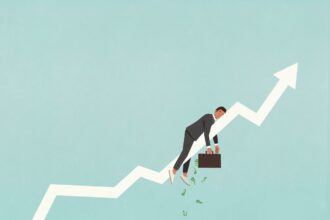Roger Federer played 1,526 singles matches throughout his career and won nearly 80% of them. However, he recently revealed that he only won 54% of the individual points within those matches. To put it another way, one of the greatest tennis players of all time barely won over half the points he played throughout his storied career.
Federer’s “It’s Only A Point” revelation came at his commencement address to Dartmouth’s 2024 graduating class and serves as a helpful reminder to investors: perfection is impossible. The stock market has had plenty of bad days and will have more. No plan, strategy, or magic trick can prevent that reality. The key is overcoming difficult moments and staying on track to plan for a happy retirement.
Think of an up day in the stock market as a tennis point won and a down day as a point lost. An examination of data from 1950 to 2023 revealed that the market was up 54% of all trading days —the same exact percentage as Federer’s points won. The analogy writes itself.
Stock Market Up and Down Days: 1950-2023
Let’s look at this through the lens of each decade, reaching back to the 1950s.
● 1950s up 56.6% days
● 1960s up 54.4% days
● 1970s up 51.2% days
● 1980s up 53.1% days
● 1990s up 54.0% days
● 2000s up 52.4% days
● 2010s up 55.2% days
● 2020s—through 2023—up 53.2% days
Within that group, the 1950s saw the highest percentage of up days, 56.6%, which led to a total annualized return of 19.3%.
The 1970s saw the fewest up days, with 51.2%. But even then, the annualized return was 5.9%. Admittedly, that’s less fruitful, but remember that it was a decade replete with economic turmoil—inflation, stagflation, multiple recessions, and an oil embargo. It also saw the political upheaval of Watergate and Vietnam. Despite those challenges, the market produced a nearly 6% annualized return.
Compare a full-year return to a complete tennis match. Positive returns can be considered a match won, while negative returns could be considered a match lost. Again, using 1950-2023 as the parameter, the market was up 74% of those years despite only being up on 54% of all trading days. Like Roger Federer’s career, the sum of the success is much greater than its parts.
The Perils of Missing The Market’s Best Days
Those wondering how punitive it can be to miss the market’s best days need only look at history as a guide. The compounded annual growth of the S&P 500 from January 1995 to December 31, 2023, provides almost 30 years of data.
Those who remained fully invested saw a compounded annual return of 8.4%. Missing the best five trading days dropped the rate of return to 6.6%—a 21% reduction. From there, it goes from bad to worse. Missing the best 10 days cuts the return to 5.5%. Miss the best 30, and it withers to 2.0%—76% lower than if the money had never been moved. Miss a month of trading, and the investor might have been better off had they left the funds in cash.
It’s impossible to time the market perfectly; trying could lead to disastrous results. History shows that an overwhelming majority of the time, the most productive strategy is to invest patiently, giving assets time to grow. Happy retirees tend to be “tomorrow investors” who focus not on daily market machinations but on their long-term money goals.
Bottom Line
Winning over 100 events and 20 major men’s singles titles, including a record eight at Wimbledon, Roger Federer is one of the most decorated tennis players in the sport’s history. The Association of Tennis Professionals (ATP) ranked him number one for 310 weeks, including a record of 237 consecutively. And yet, a man who spent four and a half straight years with a number-one ranking barely won more than half of his points.
Let this statistic strengthen your resolve on the market’s down days. Staying disciplined in investing, particularly during market fluctuations, is important for long-term financial stability. The stock market’s inherent volatility can be unsettling. It’s natural for investors to experience anxiety or fear, but giving in to those urges can lead to hasty decisions, such as selling completely out of the market.
This information is provided to you as a resource for informational purposes only and is not to be viewed as investment advice or recommendations. Investing involves risk, including the possible loss of principal. There is no guarantee offered that investment return, yield, or performance will be achieved. Stock prices fluctuate, sometimes rapidly and dramatically, due to factors affecting individual companies, particular industries or sectors, or general market conditions. For stocks paying dividends, dividends are not guaranteed, and can increase, decrease, or be eliminated without notice. Fixed-income securities involve interest rate, credit, inflation, and reinvestment risks, and possible loss of principal. As interest rates rise, the value of fixed-income securities falls. Past performance is not indicative of future results when considering any investment vehicle. This information is being presented without consideration of the investment objectives, risk tolerance, or financial circumstances of any specific investor and might not be suitable for all investors. There are many aspects and criteria that must be examined and considered before investing. Investment decisions should not be made solely based on information contained in this article. This information is not intended to, and should not, form a primary basis for any investment decision that you may make. Always consult your own legal, tax, or investment advisor before making any investment/tax/estate/financial planning considerations or decisions. The information contained in the article is strictly an opinion and it is not known whether the strategies will be successful. The views and opinions expressed are for educational purposes only as of the date of production/writing and may change without notice at any time based on numerous factors, such as market or other conditions.
Read the full article here










